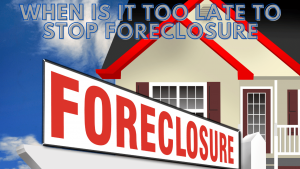When is it too late to stop foreclosure?
Foreclosure is a legal process in which a lender attempts to recover the balance of a loan from a borrower who has defaulted on their payments or the county or city attempts to recover unpaid property taxes.
If you’re facing foreclosure, you might be wondering if it’s too late to do anything about it. The answer depends on where you are in the process.
Generally speaking, the sooner you take action, the better. But even if you’re already in foreclosure proceedings, there may still be options available to you.
The answer to this question depends on what stage of foreclosure you are in. In this blog post, we will discuss the different stages of foreclosure and when you can no longer stop the process.
So when is it too late to stop foreclosure of your home?
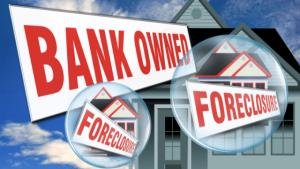
In most cases, it is only too late to stop the foreclosure process when it has been sent to public auction.
There are two types of foreclosures, a mortgage foreclosure where the bank initiates the process after you have missed several payments, and a property tax foreclosure where the county or city has begun the foreclosure process due to unpaid property taxes.
The first stage of foreclosure is when your lender sends you a Notice of Default. This notice gives you a set period of time- usually 30-90 days- to bring your mortgage payments current.
If you are able to do this, then the foreclosure process will stop.
If you cannot make your mortgage payments current within the set period of time, then your home will go into foreclosure auction. This usually begins after 120 days of non-payment.
At this point, it may still be possible to stop the foreclosure by filing for bankruptcy, hiring a foreclosure attorney or working out a loan modification with your lender.
Some states like Texas, allow non-judicial foreclosures which can happen within 60 days in some cases. In other states like Florida, it can take 6 months to a year.
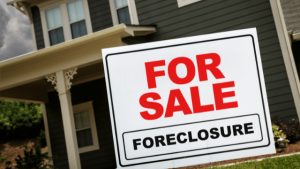
Once your home is sold at auction, it is considered foreclosed. At this point, you will no longer own the home and will have to move out. It is very difficult to stop a foreclosure once it has reached this stage, but it is not impossible.
You may be able to negotiate a post-foreclosure purchase with the new owner or file for an “order for relief” from the court.
It is important to remember that it is always better to try and stop a foreclosure before it reaches the auction stage. Once your home has been foreclosed on, it will stay on your credit report for seven years and will negatively impact your credit score. This can make it difficult to get approved for loans in the future.
Banks and local municipalities are not in the real estate sales business. They would prefer to avoid the foreclosure process altogether so they are usually quite willing to work out an arrangement with you to avoid it.
At the end of the day, they just want you to make your payments and collect interest on the money they loaned you for your home or collect the property taxes owned.
How to stop the foreclosure process
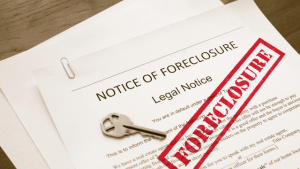
1. Contact Your Lender as Soon As You Realize You’re Having Trouble Making Mortgage Payments
If you’re struggling to make your mortgage payments, the first thing you should do is reach out to your lender and explain your situation. Many lenders are willing to work with borrowers who are having trouble making payments. They may be able to offer a loan modification, which would lower your monthly payments. Or they may allow you to skip a payment or two until you’re back on your feet financially.
2. Contact a Housing Counselor
If you’re having trouble contacting your lender or if they’re not willing to work with you, your next step should be to contact a HUD-approved housing counselor. A housing counselor can help you understand your options and negotiate with your lender on your behalf. They may also be able to help you get a loan modification or other type of assistance.
3. Hire a foreclosure attorney
A foreclosure attorney can act on your behalf with the lender to stop the foreclosure process and find options for you to stay in your home. These options can include a mortgage forbearance, filing for bankruptcy or exploring a loan modification that both parties can agree to.
3. File for Bankruptcy
If all else fails, filing for bankruptcy may give you the time you need to catch up on your mortgage payments and keep your home.
When you file for bankruptcy, an “automatic stay” is placed on all collection efforts against you, including foreclosure proceedings. The automatic stay will stay in place until your bankruptcy case is resolved or lifted by the court. However, a bankruptcy will severely affect your credit and will most likely prevent you from getting any loan for several years. It will stay on your credit report for 7 years.
4. Consider Selling Your Home
If you know that there’s no way you’ll be able to catch up on your mortgage payments and keep your home, then selling it may be the best option for you and your family. By selling your home before the foreclosure process is complete, you can avoid having a foreclosure on your credit report. The lender may be willing to allow a short sale for less than the loan balance if the home is appraised for a lower amount than what you owe.
5. Refinance
If you are still early in the process and haven’t missed too many payments, you may be able to have the home refinanced with another lender, which will give you a fresh start. This is only possible if your loan amount is less than the home’s appraised value.
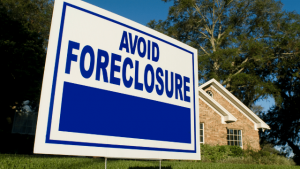
Conclusion:
If you are facing foreclosure, it is important to take action as soon as possible. The sooner you act, the greater chance you have of stopping the foreclosure process.
If you wait until your home goes into foreclosure auction, it may still be possible to save your home but it will be more difficult.
Once your home has been sold at auction, it becomes much harder to stop the foreclosure process but it is not impossible. If you find yourself in this situation, it might be in your best interest to contact an experienced attorney who can help you figure out your best course of action.

